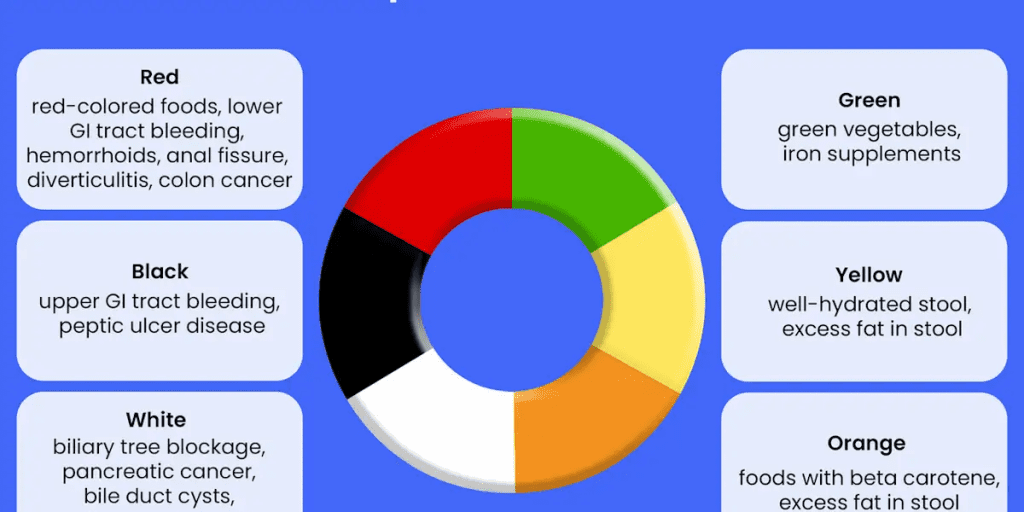Most people don’t like to talk about poop. It’s messy, awkward, and well, kind of gross. But here’s the truth: your stool is one of the most underrated messengers your body has. Think of it as your gut’s daily report card—revealing what’s working, what’s not, and whether something more serious might be brewing inside you.
Ignoring what you see in the toilet bowl could mean missing the first signs of digestive issues, infections, or even cancer. So instead of flushing and forgetting, let’s take a closer look. Here are 11 alarming things your poop might be trying to tell you—and why you should pay attention.
Black or Tarry Stool: A Potential Red Flag

Ever noticed your poop looks dark, almost like black tar? That’s not normal. Black stool often signals bleeding somewhere in your upper digestive tract—like your stomach or esophagus. It could be caused by ulcers or something more serious like gastrointestinal bleeding. The color comes from blood that’s been digested on its way through your system.
If you see this, don’t wait. Call your doctor immediately.
Bright Red Stool: Blood in the Water
Red in your stool is jarring—but not always dire. Often, it’s caused by hemorrhoids or small tears near your anus, especially if you’ve been straining. However, if it’s bright red and keeps showing up, it could point to bleeding in your lower intestines or colon. Either way, it’s not something to ignore.
Track how often it happens and don’t be shy about getting it checked out.
Pale or Clay-Colored Stool: Trouble with Bile Flow
Poop gets its brown color from bile—a fluid made by your liver. If your stool looks pale, white, or clay-colored, it might mean there’s a blockage in your bile ducts or an issue with your liver or gallbladder.
This could be a sign of hepatitis, gallstones, or even liver disease. It’s time for a liver function test.
Greasy, Floating Stool: Fat Malabsorption at Work
Does your stool float and look oily, maybe even frothy? That’s your body telling you it’s not absorbing fats properly. You might be dealing with chronic pancreatitis, celiac disease, or a gallbladder issue. Greasy poop tends to leave residue in the toilet—another subtle clue.
Video : 12 Things Your Stool Says About Your Health
If your poop slides around like it’s been buttered, it’s time to dig into why.
Pencil-Thin Stool: Narrow Isn’t Always Normal
Occasionally having narrow stool isn’t unusual, especially if you’re a little constipated. But if it becomes the norm, it could point to a narrowing in your colon, possibly caused by a blockage or even early signs of colon cancer.
Consistency is key. If this shape sticks around, talk to a gastroenterologist.
Mucus in Stool: More Than Just Slippery Business
A little mucus in your stool is normal—it helps things slide along. But if you’re seeing globs of it regularly, it could be a sign of infection, IBS, or inflammatory bowel diseases like Crohn’s or ulcerative colitis.
If it’s thick, stringy, and showing up often, your gut’s trying to warn you.
Extra Foul Odor: When Smelly Gets Suspicious
We all know poop stinks. But when it suddenly smells way worse than usual—or has a strange chemical or sour scent—it could indicate lactose intolerance, infection, or poor nutrient absorption. If the smell comes with bloating, cramps, or changes in consistency, your gut is probably in distress.
Trust your nose. Your bathroom shouldn’t smell like a science experiment.

Watery Diarrhea: Dehydration Danger Ahead
The occasional run to the bathroom is fine—bad takeout happens. But if diarrhea becomes chronic or watery and lasts longer than a couple of days, it’s time to be concerned. It can be caused by viruses, parasites, or chronic conditions like IBS or colitis.
Prolonged diarrhea = dehydration + nutrient loss = health spiral. Don’t wait.
Hard, Pebble-Like Stool: Constipation Calling
If your poop is small, hard, and looks like rabbit pellets, you’re likely constipated. This could stem from a low-fiber diet, dehydration, or even certain medications. It might also be a sign that your gut is slowing down.
Upping your water and fiber intake can usually help, but if it lingers, seek medical advice.
Green Stool: When Your Gut’s in a Rush
Green poop often comes from eating spinach or foods with green coloring. No big deal. But if it happens without a dietary reason, it could mean your digestive system is working too fast—food is moving through too quickly for bile to break it down.
It’s usually harmless, but if it persists, look for signs of infection or digestive irritation.
Sudden Changes in Bowel Habits: Pay Attention to Patterns
Has your regular routine suddenly shifted? Going way more (or less) than usual? Stool looking totally different in size, shape, or consistency? Don’t brush it off. These changes can signal infections, inflammation, or something more serious like colorectal cancer.
Video : What if You Hold Your Poop For Too Long? | How Digestive System Works?
Your gut doesn’t make drastic changes for no reason. Tune in.
Why Poop Matters More Than You Think
It’s easy to dismiss your stool as just waste. But it’s really a mirror of your digestive and overall health. By learning to recognize warning signs in your bowel movements, you can catch problems early—sometimes even before symptoms show up elsewhere.
Your body is constantly giving you feedback. Your job is to listen.
Conclusion: Don’t Flush the Clues
Your toilet isn’t just where things end—it’s where vital clues about your health begin. If you notice changes in color, texture, shape, or frequency, take a pause before flushing it away. These signs could be your early warning system, and catching issues early could make all the difference.
So the next time nature calls, take a quick glance before you flush. Your health might just depend on it.


